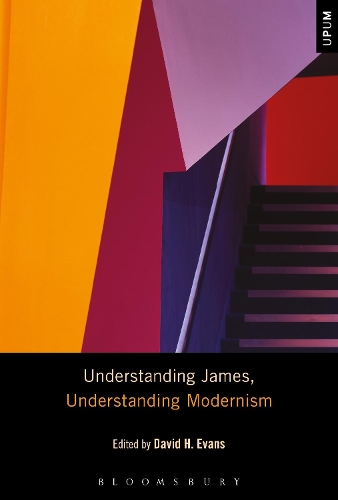
Understanding James, Understanding Modernism
(Hardback)
Available Formats
Publishing Details
Understanding James, Understanding Modernism
By (Author) Professor David H. Evans
Bloomsbury Publishing PLC
Bloomsbury Academic USA
20th April 2017
United States
Classifications
Tertiary Education
Non Fiction
History of ideas
Philosophy of mind
Psychological theory, systems, schools and viewpoints
809.9112
Physical Properties
Hardback
328
Width 152mm, Height 229mm
603g
Description
Psychologist, philosopher, teacher, writerWilliam James stood closer than any other thinker to the center of the confluence of intellectual and artistic forces that defined the culture of modernism. The outstanding feature of this volume lies in its intent to investigate Jamess influence on both American and International Modernism. It provides, on the one hand, a multifaceted introduction to students of history, philosophy, and culture, and on the other, a compendium of some of the most up-to-date thinking on this central figure. Jamess first book, Principles of Psychology (1890) immediately established James as the leading psychologist of his time, at a moment in history when psychology seemed to offer the promise of finding some definitive answers to eternal philosophical conundra. Jamess innovations would register a clear effect on much modernist art, most evidently in the stylistic prose experiments of James Joyce, Virginia Woolf, and their imitators. Jamess tentative skepticism concerning the concept of consciousness as such, and the post-Cartesian ego that was its foundation, also anticipates the questioning of the subject that would be the theme of much modern, and indeed postmodern thought. The contributors to this volume explore Jamess most essential texts as well as his influence on contemporary writers, artists, and thinkers. The final section is a glossary of Jamess key terms, with entries written by leading experts.
Reviews
Understanding James, Understanding Modernism collects into a single volume an impressive set of essays by both well-established and emerging experts guiding us through James's entire philosophy, viewed through the prism of literary and cultural modernism. Many of James's well-known ideasincluding pragmatism, pluralism, philosophical temperaments, radical empiricism, stream of thought, and the will to believeare illuminated in strikingly novel ways in this context. It turns out that modernism, emphasizing temporality, change, and the 'flux' of reality in contrast to fixity, abstraction, and unchanging essences, captures much of what is central to James's basic pragmatist, pluralist, and empiricist approach. The book offers an astonishing breadth and coverage, a plurality of perspectives on his thought that James himself would have admired. * Sami Pihlstrm, Professor of Philosophy of Religion, University of Helsinki, Finland *
With impressive scholarship, these lucid and probing essays trace William James's protean work from book to book and remind us of what an original modern thinker he was. They offer a fresh and convincing account of his intersections with boldly innovative modern writers, beginning with his own brother Henry. * Morris Dickstein, Distinguished Professor Emeritus of English, CUNY Graduate Center, USA *
This volume is an insightful and accessible entry into William Jamess thought, creating new perspectives inside a mapping of the essential ideas. It shows precisely how James translated experience into modernity, negotiating between the claims of science and opening pluralistic worlds in thought and practice. The strength of the collection is the way it addresses the entire range of Jamess works and offers a wealth of multiple relations between James, modernism and literature. * Jeremy Carrette, Professor of Philosophy, Religion & Culture, University of Kent, UK *
Evans (English, Dalhousie Univ., Canada) has assembled an impressive collection of original essays examining the varied contributions of philosopher, psychologist, and religious thinker William James (18421910) to the project of modernism. James's reflections on the nature of consciousness, religious experience, time, and meaning profoundly affected a range of artists, writers, and social and philosophical theoristsincluding his brother Henry James, W. E. B. Du Bois, Gertrude Stein, Robert Frost, and Henri Bergson. Essays on Marcel Proust, Frost, Stein, and Wallace Stevens demonstrate how significantly James's thought shaped and unshaped modernist culture. Emphasis is on James's relation to modernist endeavors in the US, the UK, France, and Italy. Students of the history of ideas will particularly value part 3, "A Glossary," which includes essays on 14 terms and concepts key to James's thinking, including habit, morality, pluralism, pragmatism, pure experience, and stream of thought. This volume offers an accessible map of James's relation to modernist aesthetics and intellectual projects and thus provides a rich base for further inquiries into modernism, aesthetics, philosophy, and religion. Summing Up: Highly recommended. Lower-division undergraduates through faculty. * CHOICE *
If the other volumes [in the series] are anywhere near as good as this one, they are a bargain Reading through the volume with its very high and consistent standards of cogency and clarity made me see the work as a really importantand livelyre-assessment of modernism itself, and a book I can no longer do without. Understanding James, Understanding Modernism is a robust defense of pragmatism, pluralism, and religious experience, and the entire volume is merrily complicit in what Evans calls the defenestration of metaphysics that would become the central philosophical project of the twentieth century. * The New England Quarterly *
Author Bio
David H. Evans is Associate Professor of English at Dalhousie University, Canada. He is the author of William Faulkner, William James, and the American Pragmatic Tradition (2008) and co-editor of America and Violence, a special issue of the Canadian Review of American Studies (2008).
